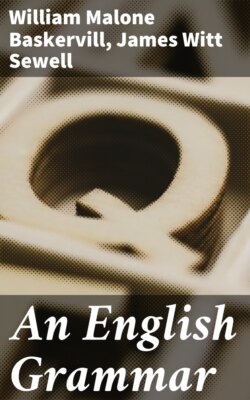Читать книгу An English Grammar - James Witt Sewell - Страница 43
На сайте Литреса книга снята с продажи.
SPECIAL USES OF PERSONAL PRONOUNS.
ОглавлениеTable of Contents
Indefinite use of you and your.
91. The word you, and its possessive case yours are sometimes used without reference to a particular person spoken to. They approach the indefinite pronoun in use.
Your mere puny stripling, that winced at the least flourish of the rod, was passed by with indulgence.—Irving
To empty here, you must condense there.—Emerson.
The peasants take off their hats as you pass; you sneeze, and they cry, "God bless you!" The thrifty housewife shows you into her best chamber. You have oaten cakes baked some months before.—Longfellow
Uses of it.
92. The pronoun it has a number of uses:—
(1) To refer to some single word preceding; as—
Ferdinand ordered the army to recommence its march.—Bulwer.
Society, in this century, has not made its progress, like Chinese skill, by a greater acuteness of ingenuity in trifles.—D. Webster.
(2) To refer to a preceding word group; thus—
If any man should do wrong merely out of ill nature, why, yet it is but like the thorn or brier, which prick and scratch because they can do no other.—Bacon.
Here it refers back to the whole sentence before it, or to the idea, "any man's doing wrong merely out of ill nature."
(3) As a grammatical subject, to stand for the real, logical subject, which follows the verb; as in the sentences—
It is easy in the world to live after the world's opinion. —Emerson.
It is this haziness of intellectual vision which is the malady of all classes of men by nature.—Newman.
It is a pity that he has so much learning, or that he has not a great deal more.—Addison.
(4) As an impersonal subject in certain expressions which need no other subject; as—
It is finger-cold, and prudent farmers get in their barreled apples.—Thoreau.
And when I awoke, it rained.—Coleridge.
For when it dawned, they dropped their arms.—Id.
It was late and after midnight.—De Quincey.
(5) As an impersonal or indefinite object of a verb or a preposition; as in the following sentences:—
(a) Michael Paw, who lorded it over the fair regions of ancient Pavonia.—Irving.
I made up my mind to foot it.—Hawthorne.
A sturdy lad … who in turn tries all the professions, who teams it, farms it, peddles it, keeps a school.—Emerson.
(b) "Thy mistress leads thee a dog's life of it."—Irving.
There was nothing for it but to return.—Scott.
An editor has only to say "respectfully declined," and there is an end of it.—Holmes.
Poor Christian was hard put to it.—Bunyan.
Reflexive use of the personal pronouns.
93. The personal pronouns in the objective case are often used reflexively; that is, referring to the same person as the subject of the accompanying verb. For example, we use such expressions as, "I found me a good book," "He bought him a horse," etc. This reflexive use of the dative-objective is very common in spoken and in literary English.
The personal pronouns are not often used reflexively, however, when they are direct objects. This occurs in poetry, but seldom in prose; as—
Now I lay me down to sleep.—Anon.
I set me down and sigh.—Burns.
And millions in those solitudes, since first
The flight of years began, have laid them down In their last sleep. —Bryant.
